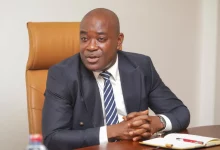The World Bank and the International Monetary Fund (IMF) defined money laundering as a process of making the proceeds of criminal activity appear to have been legally obtained.
According to the two institutions, criminals launder an estimated two to nearly four trillion dollars each year.
The criminals are known to use the financial system to support terrorists and acts of terrorism. Terrorist financiers and other criminals use formal financial system, trade based money laundering and cash couriers, particularly in countries with non-existent or weak national anti-money laundering and countering for the financing of terrorism, according to experts.
Among those who seek to disguise the illegal proceeds of their crimes are drug traffickers, corrupt public officials and organised criminal groups.
In order to stop the illegal activities that the global Anti-Money Laundering and Countering the Financial of Terrorism frame work, (AML/CFT) was established.
Ghana, as part of the global community is listed as one of the countries implementing the AML/CFT framework.
And among others, she is expected to adopt tools that would enable her to strategically implement the framework.
Unfortunately, the European Commission (EC) on February 13, 2019, decided to add Ghana to its list of countries with strategic deficiencies in their AML/CFT, framework.
Ghana, through the Ministry of Finance has in a swift response rejected the EC’s blacklist, saying that it did not reflect the current status of the country’s AML/CFT regime.
The ministry argued that Ghana’s commitment to strengthening its evolving AML/CFT Framework has been acknowledged by the Financial Action Task Force (FAFT), the global standard setting body in global AML/CFT.
“We consider the methodology used by the EC flawed, as there were no communications with Ghana concerning short comings that needed to be improved.
Consequently, Ghana was not given the opportunity to respond on time to implement corrective measures, which is the norm”, the ministry said and described the decision as premature and called for its reversal.
Going by the defence put up the government, the Ghanaian Times is inclined to believe that the decision to blacklist Ghana is flawed in many aspects.
One of them is natural justice which demands that she should be given a hearing before being sanctioned.
In the absence of an opportunity for the country to respond to any queries, how then is she expected to respond on time to implement corrective measures, which is the norm.
The decision to blacklist Ghana is indeed premature and unfortunate. We add our voice to that of the government in calling for the immediate reversal or the decision to blacklist the country.
Furthermore, we urge the EC to give Ghana the opportunity to put its case across for the world to be convinced about her status in terms of the AML/CFT framework.



